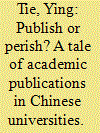| Srl | Item |
| 1 |
ID:
177494


|
|
|
|
|
| Summary/Abstract |
At present, China is undergoing industrial restructuring. However, the resource misallocation problem in China is still serious, which may affect China's green total factor energy efficiency (GTFEE). Based on previous studies, misallocation may be exacerbated by corruption, which would further inhibit GTFEE. In this study, we utilize the provincial panel data of 30 provinces in China from 2005 to 2016 to investigate the relationship between misallocation, corruption and GTFEE by employing appropriate spatial econometric methods and panel threshold model. The results indicate that there is spatial dependence in GTFEE. Local GTFEE is negative impacted by labor misallocation, while it is not affected by labor misallocation in the neighboring area. There is also evidence that capital misallocation in the local area is negatively correlated with GTFEE, although not statistically significant; while the capital misallocation in the neighboring area has significant negative correlation with local GTFEE. The results also indicate that GTFEE is not significant affected by corruption. It is also found that local corruption would aggravate the inhibiting effect of labor resource misallocation on GTFEE, while the inhibiting effect of capital resource misallocation on GTFEE would not be affected by local government corruption.
|
|
|
|
|
|
|
|
|
|
|
|
|
|
|
|
| 2 |
ID:
187855


|
|
|
|
|
| Summary/Abstract |
This study examines academic resource (mis)allocation in China by focusing on the correlation between publication in leading economics journals in China and researchers' subsequent academic performance. Our findings demonstrate that researchers with a track record of publication in the most exclusive academic outlets publish more papers in high quality journals, with an average 12.4% increase, as they move up the career ladder, obtain more external grants, and acquire more executive powers. As the observable channels fail to explain most of the publication persistence, the increase in the research productivity along a researcher's career trajectory is attributed to other mechanisms that are suggestive of resource misallocation, including a reputation effect gained from initial visibility in leading academic outlets and non-academic channels facilitated by better access to social resources, among other mechanisms. Our findings depict some intriguing observations regarding the ecosystem of a prominent subject in Chinese academia and reveal tentative evidence on how structural changes, such as fostering a more open and international research environment, could benefit early career researchers.
|
|
|
|
|
|
|
|
|
|
|
|
|
|
|
|